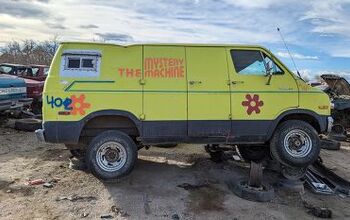Volkswagen USA Ends 18-Month Streak, Sort Of Increases October Sales
As Isaac Newton didn’t say, to go up, Volkswagen had to go down.
U.S. sales of Volkswagen brand vehicles declined 18% in October 2013, year-over-year, a 6182-unit decline in a market which expanded by 114,000 units, or 10%. Looking back, October 2013 was Volkswagen’s seventh consecutive month of decline, a streak which would continue all the way through the third quarter of 2014.
Yet this sharp decline last year enabled Volkswagen of America to announce, “increased traffic in our showrooms,” and an 8% increase in total volume for October 2014. Increases, yes, compared with a period of dramatic decrease.
This is nothing new in the world of auto sales reporting. We examine year-over-year sales comparisons for seasonal purposes – month-over-month results are skewed by the fact that Americans buy far more cars in, for instance, March than in February. And in this case, year-over-year refers to a comparison between 2014 and 2013. Volkswagen is not lying or deceiving or following anything but standard industry practice by celebrating their increased showroom traffic and increased total sales as showroom traffic and total sales as October 2014 compares with October 2013.
But after a streak of some 18 months (a streak we discussed on TTAC last month, in a September Subaru-related chart, and in an August SUV article) we feel duty-bound to point out that, while the streak has ended, we did not just witness a Volkswagen USA burst.
With 30,313 October sales in 2014, Volkswagen’s volume last month was down 12% compared with October 2012. The brand’s market share fell from 3.14% in October 2012 to 2.33% in October 2013 and then rose only slightly to 2.37% in October 2014.
VolkswagenOctober 2014October 2013October 2012Jetta14,60711,710 13,476Passat6,5137,258 8,355Golf4,0762,249 2,914Beetle1,9412,555 2,439Tiguan1,8032,153 2,752CC5931,289 2,238Touareg578549965Eos202261331Routan—105841————Total30,313 28,129 34,311These figures are still disappointing for the brand, particularly when one takes into account the arrival of a new Golf. Total Golf family sales were up 81% year-over-year to 4076 units, a 40% increase compared with October 2012. But the Golf isn’t the major Volkswagen player in America that it is elsewhere, accounting for just 13% of the brand’s volume last month.
The Passat bears much of the responsibility for the low totals in each of the last two Octobers. 8355 were sold in October 2012, but Passat volume fell 13% to 7258 in October 2013 and then dropped to just 6513 units in October 2014. This marked the third occasion this year in which fewer than 7000 Passats were sold in a single month and the third-lowest Passat month since 2012 began.
The Jetta sedan is once again a savior for Volkswagen in the United States. 11,253 Jetta sedans were sold in October 2012, but sales slid 10% to 10,161 in October 2013. 13,372 were sold in October 2014.
Excluding the Jetta sedan and the Golf family from the equation, Volkswagen USA sales slid 18% in October 2014. That figure is relevant, odd as it may sound, as it reveals the decreasing appeal of Volkswagen’s other models. Beetle sales slid 24% in October 2014, the disappearing Eos was down 23%, Passat sales fell 10%, CC sales fell 54%, Tiguan volume was down 16%. Touareg volume was up 5%, or 29 units.
Moreover, it reveals a great deal about the brand’s current circumstances. October 2014 Volkswagen USA volume wasn’t particularly healthy; it just wasn’t as unhealthy as it was at this time a year ago.
But the streak has ended.
Timothy Cain is the founder of GoodCarBadCar.net, which obsesses over the free and frequent publication of U.S. and Canadian auto sales figures.
More by Timothy Cain
Latest Car Reviews
Read moreLatest Product Reviews
Read moreRecent Comments
- Tassos Jeep again proving they stand behind freedom. The freedom to choose the fuel you use. I’ll take one in ”Right to express myself freely” pink.
- Jeff Good move on Cadillac's part. Not everyone is ready for an EV it will take more time to expand the charging infrastructure and more affordable EVs.
- 3-On-The-Tree I was never a fan of the newer dodge products but it’s still a shame that all the OEM’s are moving away from V8’s to turbo V6 and V4’s all in the name of emissions and better mpg.
- FreedMike I like the idea of EVs, but the idea that they're going to achieve 100% market penetration was a fantasy to begin with. Also worth noting; Cadillac is on track to sell well over 20,000 Lyriqs this year. Not too shabby. https://www.coxautoinc.com/wp-content/uploads/2024/04/Q1-2024-Kelley-Blue-Book-Electric-Vehicle-Sales-Report.pdf
- MaintenanceCosts This engine is a lot less interesting in a nearly-6000-pound Durango than in a 4400-pound Charger. I’ve never understood why this gen of Durango weighs in as heavy as a Wagoneer.


































Comments
Join the conversation
VW desperately needs to get back to it's core brand roots as the affordable German engineered car, with emphasis on the engineered, not so much the affordable, in light of their disastrous recent past. People will pay a premium for the German engineering. They don't want a stripped down $hitbox trying to challenge Japanese/Korean dullmobiles on price. They will pay extra for that damn German engineering and will also put up with the reliabilty issues if they perceive they are getting something special. There are glimmers of hope. The new Golf/GTI is pretty damn nice. I like that the new Sportwagen will be a Golf, as it should be. The 2015 Jetta refinements are pretty good. Except for the fact that they are stilll offering that crappy 2.0 tractor engine in the base models.
With the popularity of all of the German luxury car brands, VW should be positioning themselves as the entry and aspirational stepping stone brand for the masses to this apparently much desired club. Not a Kia/Toyota/Honda clone.